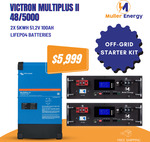PRESENTING THE IDEAL SETUP FOR AUTONOMOUS OFF-GRID LIVING 🔋🌿
This bundle delivers exceptional value and consists of:
High-quality VICTRON MULTIPLUS II 48/5000 for seamless integration into your off-grid system ⚡
Plus
2 x Muller Energy 5KWH 51.2V 100AH LiFePO4 Batteries
These batteries boast reliable and secure automotive-grade EVE cells and are supplied with power and communication cables.
Furthermore, Muller Energy offers:
• Optional personalised pre- and post-sales support from the battery designer
• Free nationwide delivery across Australia
• 5 Years Australian Warranty
All of this for just $5,999 🌟
As always, if you have any questions, please feel free to ask, I'm more than happy to answer any (relevant) question. 🙂
Thanks,
Ruben


Nice for rv or caravan setup.
Why dont you guys make a bundle with a 1kw worth of solar panels